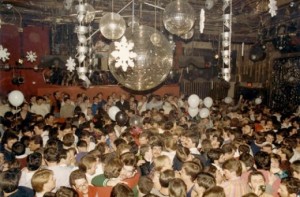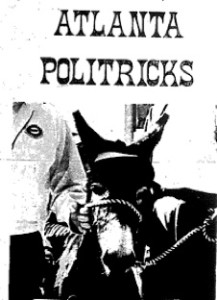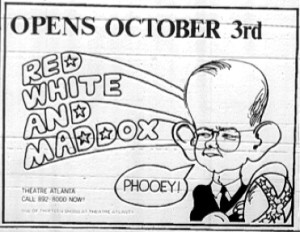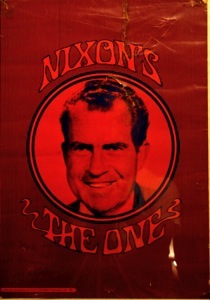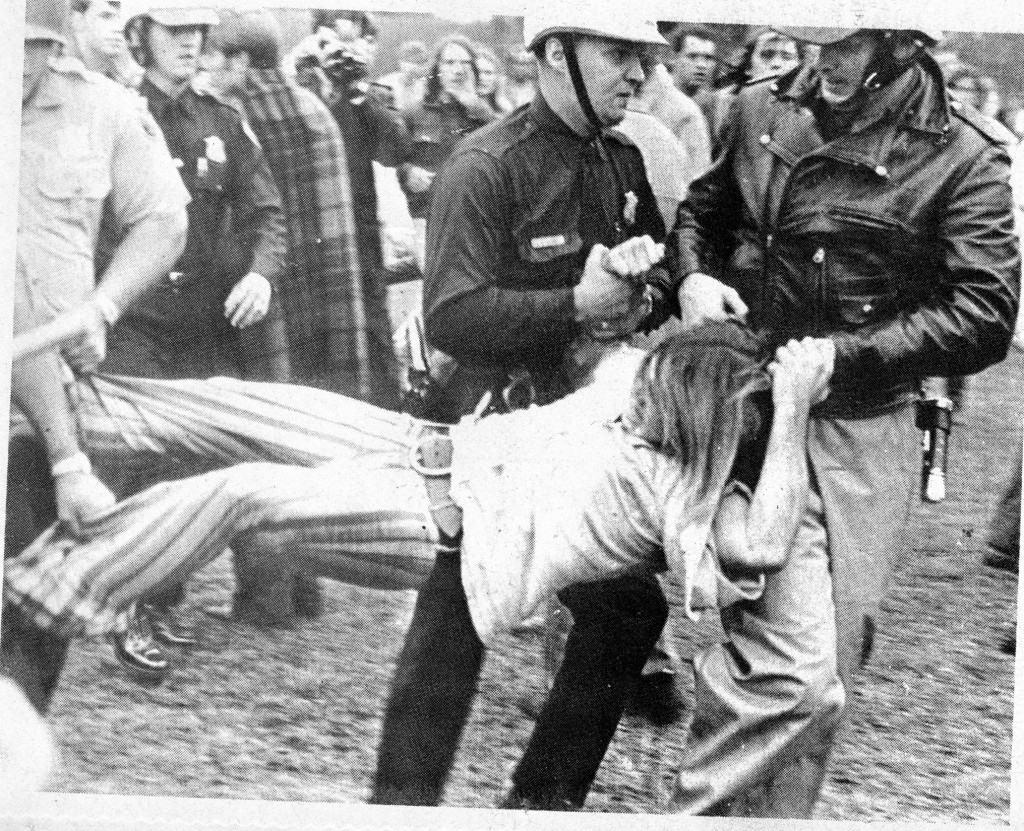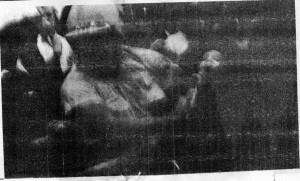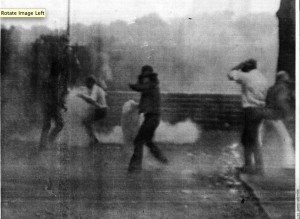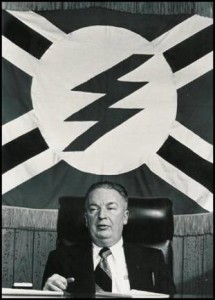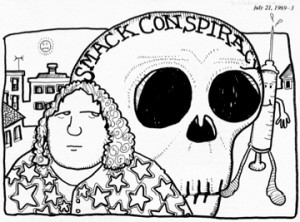Atlanta and Environs: a chronicle of its people and events; years of change and challenge, 1940-1976
By Harold H. Martin
Pg 481-483
1967
THE year 1966 was characterized by strikes that brought vast Atlanta construction projects to a temporary halt, by crime, by confrontations in the streets between civil rights advocates and defenders of the old patterns of racial relationships. Optimists hoped that at last the worst was over; but when Atlantans moved on into the year 1967, they would be shocked at continuing violence, unrest, and divergence from the norm in many areas of life.
Many Atlantans joined their fellow Americans in the increasing antiwar sentiment as more troops were shipped to Vietnam and casualties continued to mount. In February, Martin Luther King, Jr., spoke out against the war. Antiwar demonstrators marched on the Pentagon October 21, and 647 of 150,000 were arrested. Similar demonstrations had occurred in Chicago, Philadelphia, and Los Angeles. In Oakland police arrested 125, including singer Joan Baez.
And, while the war was being vigorously protested, blacks were continuing their demands for civil rights and were showing an increasing militancy. Race riots rocked 127 American cities, killing 77 and injuring 4,000. In June there were riots in Boston, Buffalo, Cincinnati, Tampa, and in Atlanta. As the weather got hotter, so did tempers. In July there were further riots in Birmingham, Chicago, Detroit, New York, Milwaukee, Newark, and Rochester. The most violent areas were Detroit and Newark. Federal troops were used in Detroit, the first use of federal forces to quell a civil disturbance since 1942. A, Black Power Conference in Newark had adopted an anti-white, anti-Christian, and antidraft resolution; and black militant H. “Rap” Brown of SNCC had cried “Burn this town down” on July 25 in Cambridge, Maryland. Police arrested him for inciting a riot. Another SNCC leader, Stokely Carmichael, urged blacks on August 17 to arm for “total revolution.”
In Atlanta Martin Luther King, Jr., firmly rejected Carmichael’s Black Power movement. However, in April King had called the U.S. government “the greatest purveyor of violence in the world,” and had encouraged draft evasion and a merger of the civil rights movement and antiwar movement.
The unrest in the black community was in some degree allayed by President Lyndon Johnson’s appointment of Thurmond Marshall to become the first black Supreme Court Justice on the resignation of Mr. Justice dark.
And a black movie star brought pride to his race by starring in three of the year’s top movies. Sidney Pointier had the leading role in To Sir, With Love, In the Heat of the Night, and Guess Who’s Coming to Dinner? All three of these movies ran for extended engagements in Atlanta’s theaters. Two decades earlier the city had banned movies that even hinted at interracial contact.
To learn more about the counterculture that was becoming so manifest, Atlanta readers would buy a rock and roll publication called Rolling Stone and try to understand what they were seeing as they rode through the section of town surrounding Tenth Street—which had been taken over completely by a new look of youth: long-haired, bearded young men and their long-skirted, barefooted girl friends—the “flower children” or “hippies”—the product of the years of unrest and drug abuse. There would soon be a local counter- culture newspaper called The Great Speckled Bird.
The hippie colony in Atlanta soon became famous far beyond its borders. Summer of Love was the title of a movie made about the hippie community in Atlanta in 1967. And a summer of love it was among the flower children; but it was a summer and ensuing years of worry and frustration for landowners and shopkeepers along Peachtree from Tenth to Fourteenth Street. The community, once a nice shopping area for in-town residents, began to deteriorate.
According to Bruce Donnelly, a young Methodist minister who at the urging of Atlanta’s church and business groups had opened the Twelfth Gate Coffee House for artists and hippie types, there were about 1,500 members of the community in the Fourteenth Street area off Peachtree in the summer of 1967. They ranged in age from thirteen to the early twenties, and among them were many missing children. Soon a new and larger hippie coffee shop, called the Fourteenth Gate, was opened on the main floor of the old building whose basement, called the Catacombs, was the original hippie hangout.
Reporter Dick Herbert wrote an insightful description of the Fourteenth Gate as it seemed to him on a visit that lasted two nights and a day:
An infant is curled asleep on the drab carpet of the Fourteenth Gate, a milk bottle’s nozzle tucked at his mouth. A boy with long hair and a girl in raggedy-edged Bermudas sit Indian style not far away, browsing through magazines.
The walls are papered with posters of old B-grade movies and in the kitchen is a table at which a frazzled red-head named Alfa and other shaggy- haired youths sell hot dogs in plain bread for 150 a piece, Keel-Aid and coffee for nickels, soda pop and chips for a dime.
In the front room is a juke-box blaring. Youths are at oil-cloth covered tables reading quietly or talking. Some have beards, some shaggy or teased but uncombed hair, some sandals, some with beads, but also some in sports clothes with combed hair and shaved faces.
Among the posters on the wall over the sleeping infant is another message: “Sorry, no crashing. It’s the law.”
“Crashing” is a Hippy word for bedding down. Hippies used to gather in “crash pads,” as many as 20 or more in one apartment, sleeping on news- papers or pallets, but police applied heat and have pretty well broken up the practice.
Dick Herbert pointed out that there were at least three types of hippies:
honest hippies, plastic hippies, and hippie types. The plastics were described by the Reverend Donnelly as “usually younger, more irresponsible, thrill-seeking teen-agers who come to the area in an indiscriminate search for drugs and sex, usually finding both and usually ending up as an arrest statistic.”
By 1968 Atlanta’s once “gung-ho” hippie colony was dead, except for a small core still hanging on. There had been some 1,500 hippies in the Peachtree-Fourteenth Street area in the summer of 1967, but two years later only about 300 remained. The others had moved on to other cities, or more likely had decided they had had their fling and, as Reverend Donnelly wrote, “had gone back home with a new lease on life.”
Crime and racial violence in Atlanta seemed to be relatively mild as 1967 moved on into its long, hot summer. The calm broke in the small and previously tranquil section of Dixie Hills in west Atlanta on June 21. There violence broke out, and a forty-six-year old man was killed and a nine-year- old child was critically wounded. Witnesses said a black youth had thrown a Molotov cocktail at a policeman, and the policeman had fired his hand gun into a crowd sitting on the steps of their apartment building. The man, Willie B. Ross, was killed and the small boy, Reginald Rivers, was shot in the stomach.
The shooting ended the second day and night of rock throwing and gun- firing that had begun on Monday night June 19, around Dixie Hills Shopping Center. On Tuesday afternoon Senator Leroy Johnson had formed a “Youth Corps,” which he hoped would help prevent a repetition of Monday night’s rock throwing and arrests. The meeting was also attended by members of SNCC.
“Later,” the Journal reported, “word was passed in the community that SNCC was planning to ‘tear the place up.’ A crowd of about 100 Negroes, mostly in their 20s, had gathered by 9:00 P.M., as dusk began to set in.”
An initial force of about 25 policemen wearing riot helmets and armed with shotguns and carbines in addition to their pistols waited around their vehicles at the shopping center. Only the Neighborhood Service Center was open at the center, and here newsmen and Dixie Hills community leaders congregated.
As darkness fell, three shots were heard. A few rocks were thrown, at least one of which crashed into a police wagon window. Suddenly, the crowd lining the streets around the shopping center had vanished.
Police waded into the darkness outside the dim lights of the shopping center. There was a fusillade of between five and 15 shots, all apparently fired into the air, as the officers attempted to drive several youths from behind a nearby apartment house. …
It was not long after the first shots were fired—not by police, the superintendent said—that the fatal shooting occurred.
For such violence to break out in this area was a surprise. Two investigative reporters, John Adkins and David Nordon, moved into Dixie Hills to a job of research. When asked why violence had broken out in such a seemingly
pg 526- the others being Dallas, Houston/Kansas City, Oklahoma City, New Orleans, and St. Louis. The questions were drawn from a list of factors cited by Business Week in 1964 as considered most important by board chairmen and corporate executive officers in deciding where to locate. . . .
There are developments which are absolutely essential to a headquarters city. One is the professional personnel to handle corporate and insurance law. The eight major accounting firms in the U.S. all have substantial representation here, affirming the city is ready for growth.
Research and development has been the salvation of businesses as diverse as American Telephone and Telegraph, and Lockheed Aircraft. The area is amply supplied. More than eighty institutions, government agencies, and private firms are doing basic and/or applied research within a fifty-mile radius. Over 340 computer installations are on record.
There is constant disagreement about whether political outlook really has an effect on the development of headquarters cities. Fortune has argued that it has a significant effect and says this about Atlanta: “The quality of the city is good, and the single most striking reason is the leadership that exists there.”
All this has brought both a construction boom and great new construction know-how. But building costs have remained reasonable. The F. W. Dodge survey said that a given building in Atlanta will cost only 72% as much as it would in New York, 94% as much as in Dallas, and 87% as much as in Los Angeles.
It has taken a combination of all these factors to make Atlanta an attractive headquarters city. And it has taken a little more. Newcomers call it “the electricity of the place . . . the competitive spirit.”10
To the influx of married business executives and farmers, field hands, and blue-collar job hunters there was an inflow of what came to be known as “Swinging Singles.” There are so-called singles bars not only in Atlanta but in every big city in the United States, from New York to Boston to Los Angeles. Such places attract millions of young college graduates to the big cities, where for the first time in their lives they are independent of their families and a planned pattern. “They come,” said Sandra Grimes in Atlanta magazine, “with but a single purpose in mind—to meet singles of the opposite sex.” The procedure follows a pattern—”a tap on the shoulder, the right ‘line,’ the right look and young men can meet more girls and pick up more phone numbers in one night than a year of random girl-hunting.” Grimes continued:
These young singles are in a position of power and influence unknown ten years ago. They are better educated, better paid, freer from established moral codes than at any time in our history. And along with their freedom, financial solvency, and sexual liberation, they have become the darlings of the advertising world. With a little imagination, anything from apartments to sophisticated lounging pajamas can become a candidate for a single’s dollar. The key is youth and glamour. Market analysts have said the singles have more discriminatory buying power than any other group. They haven’t the financial burdens of the married man, and with their new affluence and swinging image to live up to, it’s no wonder they are courted and wooed by sellers of everything from stretch pants to Florida vacations. Experts figure the singles nationally as a S60,000,000,000 market, and a local singles magazine declared in a full page ad that, in Atlanta alone, singles will spend $100,000,000 this year.
There are hundreds of apartment complexes in Atlanta jammed with singles and more going up every day; there is a popular magazine published for and about singles; there are several bars where unescorted single girls are welcome; and there are at least three singles clubs in operation. …
Apartment complexes with built-in social opportunities catering to singles have sprung up all over the United States. In Atlanta, General Apartment Company has 1,540 apartment units in operation with 450 more under construction. Their projects include The Red Lion, The Lemans, and The Bordeaux. One young man planning his strategy from The Red Lion told us that “On warm summer nights, all you have to do to meet a nice girl is step out on your front porch.”
Peachtree Towne Apartments, sophisticated, beautifully designed two- bedroom units for singles, was conceived and developed by Don Davis, president of D. Davis & Company. Davis was among the first to study the singles idea in housing, and his Peachtree Towne is so widely known that young people come here from as far away as New York and California without a job or acquaintances, knowing only that they will live at Peachtree Towne. . . .
The National Association of Junior Executives, Incorporated, is the strongest and most active of the singles clubs in Atlanta with Larry Poling as president. JE now has 3,300 members; and with an estimated 83,000 singles in Atlanta, they predict this is just a beginning. They have promoted JE on radio, they have given parties at some of the best-known singles apartments, and have mailed out 10,000 applications to singles all over Atlanta. . . .
Atlanta’s young adults regard their sex lives as very personal and very private, and quite different from the exposes of swinging singles published by national magazines. In a meeting with about thirty-five attractive singles at Peachtree Towne, Attorney Lurton Massee summed up the general consensus: “Sure, our sexual mores are a little more liberal than our parents’ were. We all seek a close personal relationship with people we date—and the most of us expect that to be culminated in a sexual relationship. But this is not the focal point. We want a relationship we can enjoy in depth. Most of us spend most of our time thinking about who we are and where we’re going.”
Marriage? “Someday,” they say, “but not now, not just yet.” Most feel that they have opportunities for interesting careers, travel, and human experiences denied the married man or woman, and that possibly the one who waits Not fires, but firefighters made news the first two weeks of August when Negro firefighters chanted the old cry of racism. About forty Negro employees of the Atlanta Fire Department visited Mayor Ivan Alien on August 8 to complain that they were still subjected to racial abuses within the department and suffered discrimination in promotions. William Hamer was spokesman for the group and said that the men he represented were called “boy” and “nigger” at the station houses, were made to sleep in a segregated area, and had to shine the station captain’s shoes. Mayor Alien listened to testimony from nineteen Negro firefighters and then asked Fire Chief P. 0. Williams and Alderman William T. Knight to give him a report as soon as possible.
Ten days later Chief Williams submitted his findings of alleged discrimination against Negro firemen in a memorandum to Mayor Alien. Dealing primarily with office procedure for addressing grievances, the chief fired off a memo to all personnel in the department to address one another by their surnames and officers by their rank. One of the sore spots in the controversy with the black firefighters was the denial of their entrance into the department’s social club at Lake Allatoona. In Williams’s letter, it was noted that the club was a private organization controlled by a board of trustees that determined policies for membership. It was supported entirely by dues and was maintained through voluntary services of the members.
On August 26 the confrontation came. William Hamer, accompanied by five other Negro firefighters, argued with the Board of Firemasters that segregation existed within the Fire Department and had plagued Negroes since their initial hiring in 1963. Hamer argued that the blacks should have been given an opportunity to participate in the current rewriting of the department’s rules and regulations handbook. Alderman Q. V. Williamson, present at the hearing, gave Hamer a copy of the suggested regulation changes and asked him to return it in three days with his suggested changes.
Williamson, the city’s only Negro alderman and the first in Atlanta’s modern history, summed up the issue thus: “It’s common knowledge that discrimination against blacks joining the fire department existed openly prior to 1963 because they were not permitted to be foremen. Now, all these men are actually saying is that discrimination still exists, but has gone under- ground.”
Williamson was elected vice-president of the Board of Aldermen early in the year and was third in line of command of the city government. From Friday, March 13, through the weekend; Williamson served in a way as Atlanta’s first Negro mayor because both Mayor Ivan Alien and Vice-Mayor Sam Massell were out of town.
In October, Williamson was no longer the only Negro alderman in Atlanta. As a result of the fall election, four new Negro aldermen were named. They were: Ira L. Jackson, a businessman; Joel C. Stokes, a prominent banker; Marvin Arrington, an employee of Emory University, and H. D. Dodson, a commercial photographer.
The election of the new black aldermen drew attention to the interesting fact, as the Journal reported:
Black people are now filling 246 kinds of jobs in city government, whereas 10 years ago they worked in only 14 mostly menial and custodial jobs. Carl Sutherland, retiring head of the city’s Personnel Department, said that of the city’s 8,159 employees, 37% are black. He stated that more blacks than whites are being hired at City Hall, but admitted there was a dearth of black people in city department administrative positions.
“Since most of the high-level jobs in city government are filled by career employees with long service, it will take quite some time for black people to move into these high-level jobs,” he added.
These comments raised an outcry from incoming Mayor Sam Massell, Vice Mayor Maynard Jackson and Negro senator Leroy Johnson. Mr. John- son’s comment was “Our thrust is to get black people into department head jobs. What we really need in this city is a black director of personnel . . . .”
Sutherland said when he hears demands about why more blacks are not in City Hall’s employ, “I show them the statistics and they are usually favor- ably impressed. According to recent charts, Negroes hold 3,206 out of 7,023 positions in City Hall Departments.”
Changing times and changing life-styles brought an end at last to one ancient Atlanta business institution—the once-busy National Stockyards on Brady Avenue in northwest Atlanta. The last animal left there was one lone mule, owned by Ben Burnett, president of McClure-Burnett Commission Company, and it was up for sale. The complexities of urbanization had caught up with the cattle farm, where 1,500 to 2,000 head a day had been paced through the auction ring. McClure continued to maintain an office in Atlanta, but he moved his mule and cattle auctions to barns in Rome and Toccoa, Georgia.
Another Atlanta institution—no mule barn, but a landmark food purveyor—passed from the civic scene late in 1969. Old-time lovers of the Tenth Street community on Peachtree bade a sad farewell to a longtime favorite shopping place—Roxy’s Delicatessen. Opened in 1923 by Jack Franco, it bowed out because of the hippie community that is surrounding it. The hippie community, in fact, was much in the news in 1969, mainly in the area of drug abuse.
Crime in every form, indeed, had been rampant in the Atlanta metro area during 1968, and predictions, which proved accurate, were that 1969 would be even worse. “Atlanta’s predicted and ‘disturbing’ increase in crime last year was borne out in new indictment figures that show some of the most alarming gains were in murders and abuses of the narcotics laws.” Fulton District Attorney Lewis Slaton said that the newly released total of indictments—4,037—was a 25 percent rise. Of this figure, 140 were for murder; 312 were for assault with intent to murder; 139 cases involved narcotics; 319 were for robbery and 761 for burglaries.
And, Atlanta, as forecast, did keep up the unhappy pace in 1969. By the middle of October the crime situation was such that “an angry, red-faced, sometimes shouting Governor Maddox” threatened to order state troopers to Atlanta to bring “law and order” to a city he saw as besieged by “bums, criminals, anarchists and drug addicts.”
Maddox charged that “sorry, no good, cowardly” Atlanta city and police officials had condoned, encouraged and sometimes joined with those who echoed the Communists’ cry of “police brutality.” Maddox said he did not want to order state action but felt either the police had to stop crime or vigilante groups had to do it “or the anarchists will take over.”
This tirade was apparently triggered by word that Atlanta police had slowed down their arrests of hippies in Piedmont Park. “In surrendering Piedmont Park to filthy and lawless elements, Atlanta officials have created another island of immunity for those who will, to proceed with sexual immorality, drug abuse and other lawless acts,” Maddox charged. Mayor Alien and Police Chief Herbert Jenkins replied that they would meet with the governor and be happy to consider his recommendations.
“Police brutality” was charged against Atlanta uniformed officers by one of their own number in September. DeWitt Smith, a five-year veteran of the department and a Negro, accused five of his white fellow-officers, including a lieutenant, of beating, stomping, and choking and kicking two Negro prisoners who had been brought into city jail. Smith, trying to choke back tears, told the story of what he had seen. Mayor Alien expressed confidence that Chief Jenkins would take whatever action was necessary, and Jenkins pledged to do so. But placating words from high civic authority did nothing to quell the rising tide of black anger.
On Monday morning, September 15, about fifty angry Negroes pushed past Mayor Ivan Alien, Jr.’s police aide at City Hall and demanded that Alien temporarily suspend Chief Jenkins and place the department under a committee of aldermen and citizens. Alien refused and told the group that Jenkins was as interested as anyone else in getting the truth of recent allegations of police brutality. Two days afterward, Jenkins strongly recommended the hiring of civilian turnkeys to handle prisoners at City Jail.
In meetings at the Greater Calvary Baptist Church and at the West Hunter Street Baptist Church, Lonnie King, head of the local office of the NAACP, the Rev. Joseph Boone, director of the Metropolitan Atlanta Summit Leadership Conference, and Jesse Hill, cochairman of the conference, presented blacks who testified that they had been brutally handled by police. As a result, the clamor to oust Chief Jenkins increased in vigor, and a suit was filed in federal court demanding that this be done. Joining in this legal action, which Atlanta City Attorney Henry Bowden described as being purely political, in addition to the above were the SCLC, the African Soul Brothers, the Bankhead Court Civic League, and the Tenants United for Fairness (TUFF). By mid-September the FBI had been called in, according to Atlanta’s Special-Agent-in-Charge Frank V. Hill, and the Fulton County grand jury was asked to conduct its own special probe.
By October 1 the charges of brutality by police against the blacks had been somewhat overshadowed by similar charges in which Atlanta’s hippie colony, most of them white, were the victims. The confrontation came to a climax on a Sunday afternoon in Piedmont Park. Chief Herbert Jenkins told the story in his personal history My Forty Years on the Force. After describing the hippie community, known as “the strip,” lying along Peachtree from Fifth Street north to Fourteenth, he said:
There were many cases reported in the beginning wherein teenagers from very proper homes would drive their cars to Piedmont Park, quickly change into their hippie clothes, and then walk to the strip for several hours of excitement. Returning to their cars, they would change back to straight clothes and drive home. These kids were interested only in looking and satisfying their curiosity. But then more unsavory types were attracted to the strip and the term flower children became a misnomer. As late as the winter of 1969 drugs were virtually non-existent in Atlanta. The arrival that summer of thousands of kids from other parts of the nation who were heavy into the drug culture created a massive drug problem for Atlanta police which has yet [1973] to abate.
There were different opinions among public officials, civic leaders and the police of what approach and policies should be applied by the police to control the situation. There were those who insisted on a hard-nose policy— go in there with enough police with night sticks, tear gas, and necessary force to clean the hippies out and/or lock them up. But it had been clearly demonstrated in the civil rights movement that to arrest hundreds of demonstrators (actually, in the case of the hippies, the only demonstrating was walking the sidewalks) for minor violations did not correct anything. Usually such efforts just created more problems. I agreed with the group that insisted a more tolerant approach be used, and that every effort be made to control the situation without the use offered or arrests. Thus only flagrant violators would be arrested and force used as a last resort. The police officers assigned to the strip were carefully selected so that those officers who were in sympathy with this policy and understood it and could make it work would be assigned to the hippie community. But there was such a wide difference of opinion among public officials, the citizens, and the police that this was not always possible.
This conflict reached an explosive point in Piedmont Park on a Sunday afternoon in August of 1969. Large groups of hippies had gathered in the park and grass and other drugs were being sold openly and used openly. The relationship between the police and the hippies had been declining all summer as drug usage accelerated. A decidedly bad element had infiltrated the hippie movement. Pressure was intense from residents of the community to “do something” about the situation. What happened was a confrontation between the police and the hippies when the police tried to make a drug arrest. A near riot developed—the news media were on the scene and the cameras were grinding. Ultimately, many arrests were made and several people were injured, including some police. It had been a nervous summer and not only were the police and hippies uptight but countless Atlanta parents of children in the metropolitan area who had been unable to keep their children away from the strip and away from this particular rock concert in the park and had accompanied them to Piedmont Park for the concert. Many of these parents entered into the fray, some against the police but many taking it as an opportunity to beat up some hippie. A lot of hippies were battered that day not by the police but many by irate parents and neighborhood residents.7
Jenkins was called before the grand jury to report on this incident, as well as the charge of brutality filed by the black leaders. His eloquence and obvious sincerity seemed to have prevailed, for the grand jury in its presentments released on Sunday, November 2, called the recent charges of police brutality “exaggerated and lacking in substantial evidence.” To Chief Jenkins, the grand jury’s probe had obviously been “an excellent job of investigation.”
The grand jury’s findings by no means ended the confrontation between police and hippies and drug users and peddlers in general. Drug raids continued throughout the fall, with large amounts of marijuana and narcotics being confiscated by the authorities. In most cases the people arrested were very young—in their middle teens. In December, though, a twenty-seven-year old Atlantans who police said was the king pin of the LSD traffic at pop festivals was arrested while attempting to deliver fifteen pounds of marijuana and 900 LSD tablets to Cocoa, Florida. A long-haired man, he was known in hippie circles as “Atlanta Schroder.” When his apartment, which he shared with several others, was searched, 5,000 LSD tablets were confiscated. Schroder, being absent, was not among the eighteen arrested in this raid.
Thus the city continued the pressure on its hippie area. Raids by local and state officers sparked a near-riot and the arrest of thirty-eight persons. The raids, conducted in the Fourteenth Street, Peachtree, and Piedmont Avenue areas, were greeted with catcalls, obscenities, and a shower of bricks and bottles when a crowd of nearly two hundred people gathered. The raids followed a two-month investigation of the area. The officers had search warrants for five places and arrest warrants for eleven individuals who had sold drugs to undercover agents. Det. Lt.J. R. Shattles charged in his report that “most of the agitators came out of the Speckled Bird [underground newspaper] office and instigated the hostile action toward police.”
State drug inspectors also were hard at work in the Atlanta area trying to break up a narcotics ring. On August 12 it was announced in headlines that they had been successful and that three doctors and a dentist had lost their federal narcotics licenses.
Joseph Weldy, the state’s chief drug inspector, put investigator Richard Andrews to work—seventy to eighty hours a week—searching through druggists’ files to find names of people who seemed to be buying abnormally large amounts of narcotics. One of the ways the drug racket worked was for a person to go to a physician and fake an illness, get a legal prescription, and then steal a pad of prescription blanks, duplicate the real one many times, and then use them at different drug stores. The crackdown on prescriptions resulted in a rash of drugstore burglaries for narcotics.
Another series of burglaries involved a ring of drugstore burglars who were distributing stolen prescription drugs widely in the Fourteenth Street- Piedmont Park area. The stealing of drugs continued, and police made numerous raids throughout the year in an attempt to ferret out the ringleaders. One of the most frightening aspects of drug abuse was the increase of users in the schools.
Local juvenile court judges and police officers described DeKalb and Fulton high schools as places where drug usage was common and on the upswing. DeKalb Juvenile Court Judge Curtis Tillman believed there were 100 addicts for every case he heard and declared that no high school in the Atlanta area was without its drug sources.
Although Atlanta police kept busy with their efforts to nab drug abusers and murderers, they also had the job of keeping up with a rampant lottery operation in the Atlanta area. Accusations were brought against sixteen per- sons, including two Atlanta police, for allegedly conspiring to operate a multi- million-dollar lottery with headquarters in Atlanta, which was described by law enforcement officials as the largest in Georgia. Of the two police officers, one was a former detective on the lottery squad. Most of the evidence against the sixteen was obtained through wiretaps on the phones of three of the people.
Atlanta’s booming lottery operation, which paid off at 500 to 1 instead of the usual 400 to 1, naturally attracted the attention of big-time racketeers elsewhere. Two of these were Gilbert Beckley of New York and Tito Arini of Miami, who came to Atlanta and soon, according to FBI Agent Donald Burgers, had completely taken over the operation of the Atlanta lottery. Beckley’s triumph was short-lived. By October 10 he had been arrested.
Following close on the heels of the arrest of New Yorker Gilbert Beckley was the raid conducted by six Atlanta law enforcement agencies. They battered their way into a closely guarded gambling casino in Cobb County.
